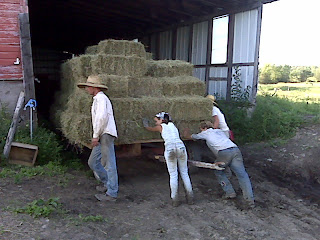When I realized I would be passing through Essex, I had contacted Mark and Kristin, the managers of Essex Farm -- a CSA first mentioned to me by the good folks at Crashed Wagon and which had come up in conversation many times as I made my way across Vermont. Essex is an anomoly, the first farm I had ever heard of that had a year-round, full-diet CSA. Not only that, but members come by each week and take however much they feel they need of whatever is available (including produce, raw milk, eggs, yoghurt, stew beef, whole chickens, bacon, homemade soap, and more). Fortunately, Mark -- who, it turns out, had cycled around the country himself and worked on farms about a decade ago -- called me back and welcomed me into the farm fold for a couple of days. I arrived early Sunday afternoon just in time to help with the hay baling.
Now, let me just preface the next bit with an assurance that I am no slouch when it comes to physical work: I'm small but scrappy. Those bales weighed a ton. (Chad, who was driving the horses, helped me considerably by tossing the newly tied bales up onto the wagon; yet even stacking them once on the wagon was pretty tough.) I found out later that because they were still pretty wet and muddy the bales weighed about twice what they normally do. Which is to say: I slept well that night on the couch at Yellow House (the place in town that Mark rents out for the longer-term farmers). After an enormous ice cream cone, a glorious shower, and some dinner with the friendly group of young farmers, that is.
Monday morning started at 5am for the crew. (As I was not trained in milking, I lollygagged about the house until about a quarter past six.) After a group breakfast and discussion of tasks for the next few days, I headed out around 8:00 with Jesse, Racey, and Justin to harvest prickly zucchini, crunchy beans, and recalcitrant garlic. Already sore from hauling around crates of veggies by 11:00, I volunteered to help the culinarily talented Courtney in the kitchen with lunch (and a good thing, too, as it turned out to be a crowd of nearly 20 that afternoon). After lunch, I helped pick carrots for a few hours before moving over to tying up garlic for drying in the barn. As other farmers finished up their own tasks they wandered into the barn to help with the hundreds of clusters that Racey and I were tying up. What seemed like unending bushels quickly disappeared as more folks joined. As Courtney put it: many hands make little work. This spirit of shared labor captures the essence of the farm. That evening when we finished up, a bit after 6pm, I gobbled some of the lunch leftovers, took a much-needed shower, and pulled my exhausted self and sleeping bag to the upper level of the barn where I fell asleep amid the sweet scent of hay and drying garlic.
Aside from the obvious enthusiasm for their work, I was impressed with how the group as a whole -- ranging from folks just out of high school to those in their mid 30s -- got along. It is a mix of staff, seasonal workers, and volunteers, and Mark clearly relies on the energy, the particular knowledge, and varied experience each of his farmers brings to the table -- from metal working to drafthorse care to animal butchering. He seems to have a knack for open discussion and delegation, and a determination to solve old problems in new ways. Underpinning everything is a belief that a local, diversified farm can fully support the diet of a community. And Essex Farm is doing it, with 90 members this year supported by 300 acres (and plans for expansion to utilize all 500 acres). It was by far the most physically demanding farm work I've done thus far, but the farm was also one of the most inspiring. I hope to make it back to this vibrant place again, for a longer stint next time. (In particular, I look forward to trying more of the kim chee recipe that the farm is currently tinkering with.)
Sent from my Verizon Wireless BlackBerry



















